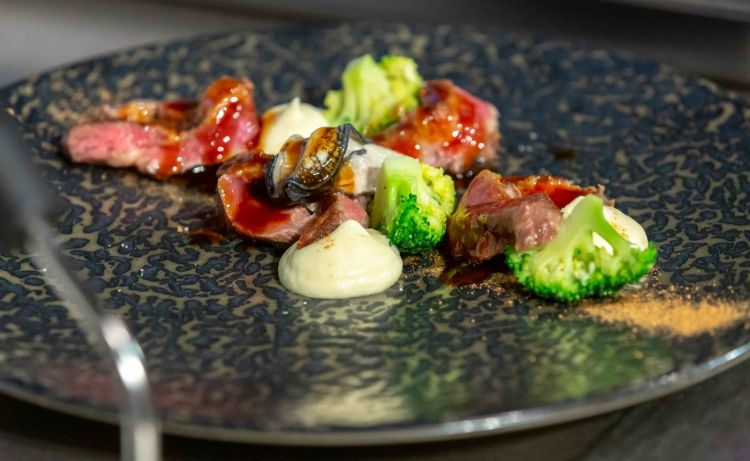Spanish father, a diplomat, and Italian mother, born in Chile but raised in Switzerland, Spain and Italy. Gonzalo Luzarraga has a decisively international cultural and culinary background, yet he has chosen our cuisine (with some exceptions) as his point of reference at Rigò. His restaurant in London is now about to leave its location in Fulham to move towards the centre, to a more cosmopolitan clientele, and possibly more inclined to different influences.
Indeed Rigò is not exactly an Italian restaurant, or at least it’s not what many people – abroad – would expect from an Italian restaurant.
«Italian fine dining is not very successful in London, where people prefer classic cuisine; there’s a psychological barrier, people need categories. Many expect to find pizza and carbonara in an Italian restaurant, and if this is not the case, they’re disappointed».
Though he has the pleasure of his clients at heart and he wants to present dishes that will thrill most people and be of their liking, he didn’t bend and for sure his menu doesn’t include pizza, nor “spaghetti Bolognese". Very simply, he stopped using Italian for the name of the dishes and the ingredients in the menu, and accelerated his experimentation, feeling free to investigate his many identities, starting from British raw materials.
His dishes reveal an Italian DNA only to those who have an intimate knowledge of our cuisine, while everyone can appreciate its multicultural, creative and decisively contemporary dimension: “without borders”, as it’s often defined by those who have gone beyond culinary clichés and enjoy the pleasure of finding in his dishes traces of his journeys.
«I was raised in Italy, but I often visited Spain and this is where I first developed my taste. One of my first memories is sea urchins: a strong flavour, which at first I found too strong, but then it charmed me. These days I’m working a lot on trying to present that sensation of iodine in my dishes, developing it in multiple ways».
For instance, he does so with the unusual seaweeds that have the aroma of truffle, which he serves with egg to replicate the classing pairing, but offering a salty note too, or with the Iberian pluma matured for a long time and served rare and paired with oysters, broccoli and parsnip cream.
«I got the idea in Hong Kong: on my way back home at night, I was hungry and I would stop at a kiosk where a man was brushing fried pork rind with oyster sauce. I wanted to replicate that flavour in a dish, and I find the slightly irony flavour of rare meat goes perfectly well with oysters. After all, it’s a very popular pairing in Ireland!».
The rice (not risotto!) is emblematic, and very good too. It’s mantecatowith black garlic which he ferments himself, with seaweeds and acacia honey. It’s the result of a long study on seaweeds (he uses 7 different types, from the coasts of Scotland) and on honey, and their possible reactions – «Acacia honey gives a note of liquorice while with chestnut honey a note of vanilla comes out, and with millefiori there’s a smoky flavour» – one sensation after the other.

Iberian pluma with oysters, broccoli and parsnip cream
There’s the creaminess of rice, enveloped in the fermented notes of the garlic, and the iodine and vegetal notes of the seaweeds (cooked so long they almost break, and then dried and powdered) reinforced with kale– a popular superfood –, also powered. «I used to add black peppercorns too, but not everyone liked it, so I removed it», the chef explains.
The only thing on which he has refused every compromise (almost) is the cooking of the rice, which we find perfect: «For the English, the cooking of the rice is an issue. They would like it overcooked. Coming from Piedmont, I wouldn’t cook it for more than 14 minutes. I meet them halfway, but not quite».
Translated into English by Slawka G. Scarso